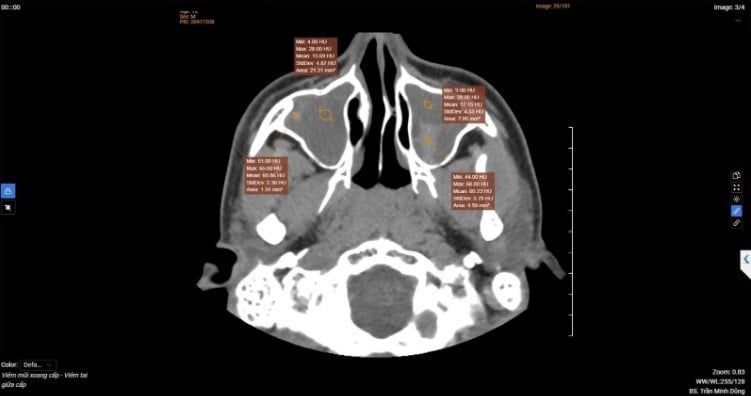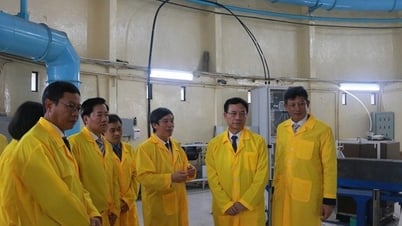Previously, the child had many times suffered from acute rhinopharyngitis with symptoms of runny nose, stuffy nose, and recurrent phlegm, but the family only bought medicine to treat it at home without seeing a specialist.
 |
| People with sinusitis need to see a doctor and get treatment early and thoroughly to avoid prolonging the disease because sinusitis lasting more than 3 weeks can cause dangerous complications. |
Through examination and paraclinical tests, doctors diagnosed the baby with chronic sinusitis with complications of bilateral otitis media, requiring surgical intervention to avoid serious consequences.
The child came to the ENT specialist at MEDLATEC Go Vap with tinnitus and hearing loss on both sides lasting about 2 weeks.
According to the family, about a month ago, the baby had symptoms of a green runny nose, mild nasal congestion, itchy nose, and sneezing. The family bought medicine to treat the baby at home for a week, and when the symptoms improved, they stopped taking the medicine.
However, the baby then began to have tinnitus and prolonged hearing loss of unknown cause, so he was taken to the doctor. The results of the ENT endoscopy showed that there was a lot of cloudy pus in the baby's nasal cavity, the nasal turbinates on both sides were congested, the palate had fluid, and the tympanic cavity on both sides was full of fluid.
In addition, the tonsils and adenoids were both grade III enlarged, a common sign in children with recurrent rhinopharyngitis. Based on the endoscopy results, the doctor diagnosed chronic pansinusitis with complications of bilateral otitis media with effusion.
To determine the extent of the disease and associated damage, the patient was ordered a CT scan of the sinuses. The results showed that all sinuses had mucosal edema, fluid accumulation, blocked ostium complexes, and fluid in the middle ear and mastoid sinuses on both sides.
The nasal septum was deviated to the left, and the middle turbinates had air sinuses. Based on the Lund-Mackay scale, the doctor determined that the child had grade IV pansinusitis, the most severe level, with complications of secretory otitis media and bilateral mastoiditis.
Dr. Tran Minh Dung, an ENT specialist who directly examined K., said that the initial symptoms seemed simple, just a runny nose and a transient stuffy nose. Moreover, the patient came to see the doctor mainly because of ear symptoms.
However, based on the history of previous sinus symptoms, the doctor thought of complications of sinusitis and prescribed appropriate diagnostic methods.
In this case, simple medical treatment such as antibiotics, anti-inflammatory corticosteroids, and nasal sinus irrigation with saline will not be effective, so the doctor advised the family to have surgery to avoid future complications.
Normally, Lund-Mackay grade I-II pansinusitis only requires medical treatment, but grade III-IV pansinusitis mostly requires surgery, especially when there are complications of secretory otitis media due to sinusitis.
The baby needs to be treated medically 2 weeks in advance to reduce inflammation and swelling in the sinuses and middle ear, and to prepare for the upcoming surgery. Surgery when the baby has acute inflammation can cause bleeding and dangerous complications. Medical treatment helps increase the success rate of the surgery and limit complications during the procedure, Dr. Dung shared.
According to doctors, pansinusitis is an inflammation that occurs simultaneously in two or more sinuses in the paranasal sinus system such as the frontal sinus, maxillary sinus, ethmoid sinus, and sphenoid sinus.
This is a more severe form of sinusitis due to the widespread damage, often appearing after the patient has acute sinusitis that is not completely treated or is caused by allergies, bacteria, viruses or fungi.
Symptoms of pansinusitis are often longer lasting and more severe than those of simple sinusitis, including nasal congestion, persistent runny nose (mucus or pus, often with a foul odor), headache, feeling of heaviness in the forehead, around the eyes, and cheeks, increased when bending the head, coughing most at night due to fluid running down the throat (postnasal drip), decreased or lost sense of smell, bad breath, and prolonged fatigue.
Sinusitis can cause inflammation to spread to neighboring organs such as the larynx, tonsils, eye sockets, nose... especially complications of otitis media.
If not treated promptly, secretory otitis media can progress to chronic otitis media, causing collapse and retraction of the eardrum, leading to hearing loss, tinnitus, and even dangerous complications such as facial paralysis, meningitis, and mastoiditis.
MSc. Tran Minh Dung recommends that people who do not have sinusitis should take proactive measures to prevent it by keeping their nose and sinuses warm, taking warm baths, avoiding cigarettes, dust, and allergens; eating lots of green vegetables and fruits and drinking enough 2-3 liters of water per day.
For people with sinusitis, it is necessary to see a doctor and get treatment early and thoroughly to avoid prolonging the disease because sinusitis lasting more than 3 weeks can cause dangerous complications.
Source: https://baodautu.vn/benh-ly-tai-mui-hong-o-tre-co-the-gay-ra-bien-chung-nguy-hiem-d346798.html




































































































Comment (0)